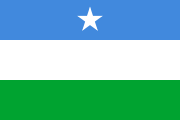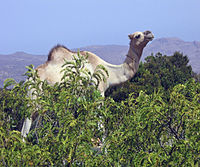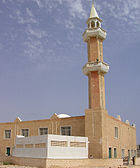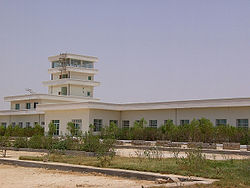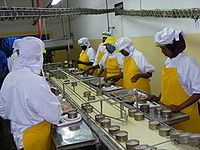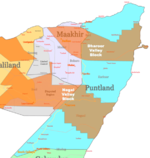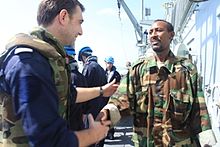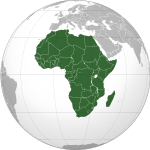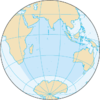- Puntland
-
Puntland State of Somalia
أرض البنط

Flag Coat of arms Motto: (Star of the North) 
Capital Garowe
8°24′N 48°29′E / 8.4°N 48.483°ELargest city Bosaso (commercial capital) Official language(s) Somali and Arabic Demonym Somali;[1] Somalian[2]
- Puntlander
Government Presidential Democracy - President Abdirahman Mohamud Farole - Vice-President Abdisamad Ali Shire Autonomy In Somalia - Proclaimed 1998 - Recognition unrecognized Area - Total 212,510 km2
132,047 sq mi- Water (%) Negl. Population - 2009 estimate 3,900,000[3] - Density 18/km2
46.6/sq miCurrency Somali shilling ( SOS)Time zone EAT (UTC+3) - Summer (DST) not observed (UTC+3) Internet TLD .so Calling code 252 (Somalia) Rankings may not be available because of its unrecognized de facto state. Puntland (Somali: Buntlaand, Arabic: أرض البنط), officially the Puntland State of Somalia (Somali: Maamul Goboleedka Buntlaand ee Soomaaliya), is a region in northeastern Somalia, centered on Garowe in the Nugaal province. Its leaders declared the territory an autonomous state in 1998.
Puntland is bordered by Somaliland to its west, the Gulf of Aden in the north, the Indian Ocean in the southeast, the central Galmudug region of Somalia in the south, and Ethiopia in the southwest.
A third of Somalia's population lives in the territory,[4][5] which contains about a third of the nation's geographical area.[6] Unlike neighbouring Somaliland, Puntland, as with all other regions in the country, does not seek outright independence from Somalia.[7]
The name "Puntland" is derived from the Land of Punt mentioned by ancient Egyptian sources. The exact location of the fabled territory is still a mystery. Many studies suggest that the Land of Punt was located in Somalia,[8][9] whereas others propose that it was situated elsewhere.[10]
Contents
History
Northern Sultanates
The Warsangali Sultanate was an imperial ruling house centered in northeastern and in some parts of southeastern Somalia. It was one of the largest sultanates ever established in the territory, and, at the height of its power, included the Sanaag region and parts of the northeastern Bari region of the country, an area historically known as Maakhir or the Maakhir Coast. The Sultanate was founded in the late 13th century in northern Somalia by a group of Somalis from the Warsangali branch of the Darod clan, and was ruled by the descendants of the Gerad Dhidhin. In the late 19th century, the influential Sultan Mohamoud Ali Shire governed the Sultanate, assuming control during some of its most turbulent years.[11]
The Majeerteen Sultanate was founded in the mid-18th century. It rose to prominence the following century, under the reign of the resourceful Boqor (King) Osman Mahamuud.[12] It controlled much of northern and central Somalia in the 19th and early 20th centuries. The polity maintained a robust trading network, entered into treaties with foreign powers, and exerted strong centralized authority on the domestic front.[13][14]
Osman Mahamuud's Sultanate was nearly destroyed in the mid-1800s by a power struggle between himself and his ambitious cousin, Yusuf Ali Kenadid. After almost five years of battle, the young upstart was finally forced into exile in Yemen. A decade later, in the 1870s, Kenadid returned from the Arabian Peninsula with a band of Hadhrami musketeers and a group of devoted lieutenants. With their assistance, he managed to overpower the local Hawiye clans and establish the Sultanate of Hobyo in 1878.[12][15]
In late 1889, Boqor Osman entered into a treaty with the Italians, making his realm an Italian protectorate. His rival Sultan Kenadid had signed a similar agreement vis-a-vis his own Sultanate the year before. Both rulers had signed the protectorate treaties to advance their own expansionist objectives, with Boqor Osman looking to use Italy's support in his ongoing power struggle with Kenadid over the Majeerteen Sultanate. Boqor Osman and Sultan Kenadid also hoped to exploit the conflicting interests among the European imperial powers that were then looking to control the Somali peninsula, so as to avoid direct occupation of their territories by force.[16]
With the gradual extension into northern Somalia of European colonial rule, all three Kingdoms were eventually annexed to Italian Somaliland and British Somaliland in the early 20th century.[16] Much of the northern sultanates' former domain is today coextensive with the autonomous Puntland region in northeastern Somalia.[17]
Establishment
Following the outbreak of the civil war in 1991, a homegrown constitutional conference was held in Garowe in 1998 over a period of three months. Attended by the area's political elite, traditional elders (Issims), members of the business community, intellectuals and other civil society representatives, the autonomous Puntland State of Somalia was subsequently officially established so as to deliver services to the population, offer security, facilitate trade, and interact with both domestic and international partners.[18]
As stipulated in Article 1 of the Transitional Federal Charter of the Somali Republic, Puntland is a part of the Federal State of Somalia. As such, the region seeks the unity of the Somali people and adheres to a federal system of government.[3] Unlike the secessionist region of Somaliland to its west, Puntland is not trying to obtain international recognition as a separate nation.[7] However, both regions have one thing in common: they base their support upon clan elders and their organizational structure along lines based on clan relationships and kinship.[7][19] Since 1998, Puntland has also been in territorial disputes with Somaliland over the Sool and Sanaag regions.
The legal structure of Puntland consists of the judiciary, legislative (House of Representatives) and the executive (the President and his nominated council of Ministries) branches of government.[3] Though relatively peaceful, the region briefly experienced political unrest in 2001 when then President of Puntland, Abdullahi Yusuf Ahmed, one of the founding fathers of the Puntland State and its first president, wanted his term extended. Ahmed and Jama Ali Jama fought for control of the region, with Ahmed emerging victorious the following year. Ahmed served his second term as president until October 2004, when he was elected President of Somalia. He was succeeded in office by Mohamed Abdi Hashi, who served until January 2005 when he lost a re-election bid in parliament to General Mohamud Muse Hersi "Adde".
Politics
Muse administration
In March 2005, then incumbent President Muse began an ambitious plan to build an airport in Puntland's commercial capital of Bosaso, a project which is now complete and referred to as Bender Qassim International Airport.[20][21]
On April 2007, Muse held meetings with Sheikh Saud bin Saqr Al Qasimi, the Crown Prince and Deputy Ruler of Ras Al Khaimah in the United Arab Emirates, where the two leaders signed an agreement on a deal for setting up of a dedicated livestock quarantine facility to facilitate the import of livestock from Somalia to the UAE.[22] On October 2008, Muse also signed a Dh170 million agreement with Dubai's Lootah Group to support the construction of an airport, seaport and free zone in the coastal city of Bosaso. Muse indicated that "I believe that when we finish all these projects our people will benefit by getting good health services, education and overall prosperity."[23]
Farole administration
The President of Puntland is Abdirahman Mohamud Farole, a former PhD candidate in the history department at La Trobe University in Melbourne, Australia. Farole was a cabinet member in Puntland's government until a falling out with then president Muse over a deal with the Australian oil company, Range Resources,[24] which led to his departure as Planning Minister in 2006.[25][26] Farole expressed doubts with regard to the agreement's legality, as Muse had reportedly awarded the contract without consulting the Transitional Federal Government in Mogadishu, the nation's capital, and engaged in a process that Farole described as far from transparent.[26] Shortly following, gunmen from a militia loyal to Farole entered the parliament building, and two militiamen and a civilian were reportedly killed nearby. According to the BBC, the "overnight siege and the clashes may be linked to Monday's deadline for MPs to approve or reject a new cabinet."[25][27] Farole left the country soon afterwards to pursue post-graduate studies in Australia.[24][28] After having reportedly turned down requests from his fellow countrymen to run for office in the past, and with the assurance of support from various political factions,[29] Farole returned to Somalia in 2008 to present himself as a candidate in the Puntland region's 2008-2009 presidential elections.[24] In January 2009, he won 49 of the 66 votes cast by parliament members, defeating the nine other candidates including incumbent President Muse, to become the fourth President of Puntland.[24][26] Despite weeks of political tension prior to the vote, the election itself was also reportedly peaceful, prompting one U.S.-based observer to suggest that the "success of the Puntland elections can begin to provide a model for the whole of Somalia."[26] In an effort to improve transparency, the new president also issued a first-ever "100 Days in Office report".[30] The regional parliament in Puntland unanimously passed the 2009 budget after six days of negotiations. In addition, Farole has since revisited Puntland's oil deal with Range Resources, delivering a policy update in which he stated, among other things, that while he acknowledges the contracts that had already been signed under a great deal of controversy, it is important to "make sure that they are benefiting the people and are within the laws of Puntland." Range Resources, for its part, responded by indicating that it "looks forward to establishing a constructive and mutually beneficial relationship with the new Puntland government and its president".[25]
Maakhir factor
In July 2007, Maakhir was declared a regional state to represent the political will of members of the Warsangali branch of the Somali Darod clan from both the northern and southern portions of federal Somalia. Maakhir is the traditional territory of the Warsangali, a member (along with the Dhulbahante, Dashiishe and Majeerteen) of the Harti confederation of Darod clans whom in 1998 created the macro region of Puntland in a grand meeting in Garowe.
The Maakhirians were one of the principal actors in Puntland politics. However, some of the clan's members felt that they had been increasingly marginalized, as the Majeerteen clan assumed an increasingly hegemonic role in the state.
In August 2008, General Abdullahi Ahmed Jama ‘Ilkajir’ arrived back in Maakhir with the promise of running and winning the Puntland presidential election[31] and consequently improve the role of Maakhirians in Puntland politics. He received a huge welcome throughout Maakhir's cities,[32] and is credited with having brought Maakhir back into the Puntland fold.
Following the dissolution of the Maakhir administration, General Ilkajir subsequently became the de-facto leader of Maakhir. He then assigned himself the duty of building up the sub-region's security structure, and to extend the local authorities' capacity to defend, serve and protect the region's inhabitants from external disruptions like piracy, charcoal profiteering and separatist adventures.
After the election in Puntland in which General Abdullahi Ilkajir ran and lost,[33] he has joined the Puntland cabinet as the Interior Minister.[34] In his new position, General Ilkajir is responsible for the establishment of local district governors across Puntland of which Maakhir territory is a part.
Speakers of the Puntland Parliament
Name Period Yusuf Haji Sa'id[35] 1998–2004 Ahmed Ali Hashi[36] 2004–2009 Abdirashid Mohamed Hersi[37] 2009–Present New flag
On December 22, 2009, Puntland's parliament introduced a new state flag. The flag resembles that of the former Maakhir State of Somalia.
Puntland's new regional flag consists of three colors: white, blue and green.
- Top: the blue stripe with the white star in the center symbolizes the Flag of Somalia
- Center: the white stripe in the center represents peace and stability in the region
- Bottom: the green stripe symbolizes the natural wealth of the Puntland State of Somalia
Regions
As stipulated in Article 3 of the Transitional Federal Charter of the Somali Republic, Puntland consists of the following regions:[3]
Puntland Regions Capitals Districts 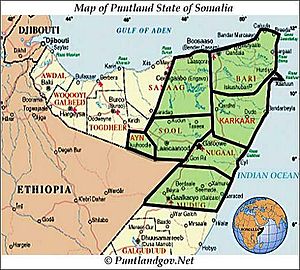
Ayn Buuhoodle 3 Bari Bosaso 8 Karkaar Qardho 3 Haylaan Dhahar 3 Mudug Galkacyo 3 Nugaal Garowe 4 Sanaag Ceerigaabo 4 Sool Las Anod 5 The regions of Sool and Sanaag are said to be under dispute, as these territories were claimed by the secessionist northwestern Somaliland macro region of Somalia. Beginning in 2003, Puntland troops entered and occupied the eastern parts of the Sool region. Fighting between the two forces led to casualties and captured prisoners, who were later exchanged.
Both the Sool and Sanaag regions have declared themselves autonomous parts of Somalia as Northland State (2008)[38] and Maakhir State (2007), respectively, but Maakhir has rejoined Puntland after the arrival of General Abdullahi Ahmed Jama Ilkajir in 2008.[39]
Geography
Puntland is geographically situated in the northeastern portion of Somalia. It is bordered by the Somaliland region of Somalia to its west, the Gulf of Aden in the north, the Indian Ocean in the southeast, the central Galmudug region of Somalia in the south, and Ethiopia in the southwest. Puntland occupies a total land area of 212,510 km2 or roughly one-third of Somalia's geographical area.[3]
Climate
The region is semi-arid, with a warm climate and average daily temperatures ranging from 27 °C (80.6 °F) to 37 °C (98.6 °F). These climatic conditions favor pastoralism as the most effective use of land in most parts of the region. The most valuable grazing land includes the Hawd region in the high plateau to the west of the Mudug and Sool regions of Somalia, and into Ethiopia and the low Nugaal valley. Mild temperatures, by contrast, are experienced only along the high mountain ranges of Bari. In all other areas, Puntland is generally characterized by tropical desert heat.[3]
Rainfall is sparse and variable, with no single area receiving more than 400 mm (15.7 in) of rain annually. Nomads primarily rely on wells as a source of water rather than surface water. There are four main seasons around which pastoral and agricultural life revolve, and these are dictated by shifts in the wind patterns. Puntland's seasons are:[3]
- Jilal – from January to March; the harshest dry season of the year.
- Gu – from April to June; the main rainy season.
- Xagaa – from July to September; the second dry season.
- Deyr – from October to December; the shorter and less reliable rainy season.
Education
Following the outbreak of the civil war in Somalia, numerous problems arose with regard to access to education in rural areas and along gender lines, quality of educational provisions, responsiveness of school curricula, educational standards and controls, management and planning capacity, and financing. To address these concerns, the Puntland government is in the process of developing an educational policy to guide the region's scholastic process as it embarks on the path of reconstruction and economic development. The latter includes a gender sensitive national education policy compliant with world standards, such as those outlined in the Convention on the Rights of the Child (CRC) and the Convention on the Elimination of All Forms of Discrimination against Women (CEDAW).[40] Examples of this and other educational measures at work are the government's enactment of legislation aimed at securing the educational interests of girls,[41] promoting the growth of an Early Childhood Development (ECD) program designed to reach parents and care-givers in their homes as well as in the ECD centers for 0-5 year old children,[42] and introducing incentive packages to encourage teachers to work in remote rural areas.[43]
Within the Puntland government, the Ministry of Education is responsible for developing and managing the region's educational needs.[44] It is headed by the Minister Mohamud Bile Dubbe, under whom a Vice Minister and Director General help oversee a Post-Primary Education Division (PPED) and a Basic Education Directorate (BED), among other boards.[45]
The educational system of Puntland comprises two years of Early Childhood Development (ECD), eight years of primary education (four years of lower primary and four years of upper primary) and four years of secondary education. Tertiary education comprises an average of four years,[46] with the region currently counting six major universities: Puntland State University in Garowe, Puntland State University in Galkacyo, Bosaso College in Bosaso, East Somalia University in Qardho,[47] Mogadishu University (Puntland branch) in Bosaso, East Africa University in Bosaso, and Nugaal University in Las Anod.[48] Thus, it is a 2-4-4-4 system. Puntland's Ministry of Education also recognizes non-formal education (NFE) and technical/vocational education and training (TVET) as integral parts of the region's educational system.[46]
From 2005/2006 to 2006/2007, there was a significant increase in the number of schools in Puntland, up 137 institutions from just one year prior. During the same period, the number of classes in the region increased by 504, with 762 more teachers also offering their services. Total student enrollment increased by 27% over the previous year, with girls lagging only slightly behind boys in attendance in most regions. The highest class enrollment was observed in the northernmost Bari region, and the lowest was observed in the under-populated Ayn region. The distribution of classrooms was almost evenly split between urban and rural areas, with marginally more pupils attending and instructors teaching classes in urban areas.[49]
Demographics and religion
As of 2006, the population of Puntland is estimated at 3.9 million inhabitants, 52% of whom are nomads.[3]
The region's population growth rate is quite high due in part to an influx of people from southern Somalia and from neighboring countries. Currently, 30% of Puntland's residents live in the fast growing towns of Bosaso, Gardo, Garowe and Galkacyo. Approximately 70% of the population is also below the age of 30.[3]
The population density in Puntland is estimated at about 18 persons per km2.[3]
As with the rest of Somalia, Islam is the main religion of the Puntland region. With few exceptions, all residents of Puntland are Muslims.[3]
Transportation
In terms of public transportation, bus services operate in Bosaso, Garowe, Las Anod, Galkacyo and Qardho. Shuttle services between the region's major towns and adjacent hamlets are also available via different types of vehicles, such as 4 wheel drives and light goods vehicles (LGV).
For air transportation, local airlines offer flights to various domestic and international locations, such as Djibouti, Addis Ababa, Dubai and Jeddah; they also provide flights for the Hajj and Umrah pilgrimages. The most prominent airlines in Puntland are Jubba Airways, Osob Air and Daallo Airlines, which operate from Bender Qassim International Airport in Bosaso and Galkacyo Airport in Galkacyo, among other places. In 2008, the Puntland government signed a multi-million dollar deal with Dubai's Lootah Group, a regional industrial group operating in the Middle East and Africa. According to the agreement, the first phase of the investment is worth Dhs 170m and will see a set of new companies established to operate, manage and build Bosaso's free trade zone and sea and airport facilities. The Bosaso Airport Company is slated to develop the airport complex to meet international standards, including a new 3.4 km runway, main and auxiliary buildings, taxi and apron areas, and security perimeters.[50]
Economy
Puntland has 1600 km of coastline, which is abundant with fish and other natural marine resources. However, after the collapse of the Somali central government in 1991, the coast was left unguarded against foreign intruders. As a result, many ships equipped with heavy trawls and other unlawful fishing equipment have occupied in Puntland's territorial waters. These ships violate catch regulations, including some which keep their catch alive and stock them in waters where fishing has been depleted. Puntland's coastal authorities continue to receive complaints from local fishermen about the damage being done by these outsiders.
Puntland exports great quantities of seafood such as lobsters, dried fish, and tuna. Sea salt is also produced.
Other economic products and activities of Puntland include livestock, frankincense, myrrh, gum arabic, manufacturing and agriculture.[51]
In Las Khorey, there is a medium size fish processing plant that produces and processes great quantities of tuna fish. The fish factory's products are of commercial quality, and its tuna is consumed throughout Puntland and also outside the region. Another fish processing plant is also being constructed in Habo, which locals hope will reduce poverty and unemployment and improve the area's economy.
Oil exploration
Puntland signed a deal with Consort Private Ltd for exclusive oil exploration rights in the territory, interpreted in the original agreement as including the Bari, Nugaal, Mudug, Sool, Sanaag and Ayn regions. Consort then sold a controlling share (50.1%) to Range Resources of Perth, Western Australia to carry out the actual exploration.[52]
Canmex Minerals (later Africa Oil) of Canada signed an agreement with Range Resources for Canmex to open oil production on 80% of any oil discovered. In return, Canmex will foot the bill for exploration, amounting to up to $70 million, plus a $5 million signing bonus for Range. On August 23, 2006, Canmex changed its name to Africa Oil Corp.[53] The company continues to be based in Vancouver, British Columbia, Canada.[54]
In July 2006, Range Resources made a presentation to both the Puntland government, which was then headed by Mohamud Muse Hersi, and the Transitional Federal Government led by former President of Somalia Abdullahi Yusuf Ahmed, on its activities in relation to the development of Puntland and the proposed strategy with respect to the ground Range retained as had previously been announced. Range also met with local clan leaders and government officials and presented a cheque for $250,000 USD to the government as a contribution to the upgrade of the Garowe Airport. The upgrade was intended to assist both Range and Puntland by way of allowing a much greater variety of aircraft to land when compared to the then existing arrangements of a dirt airstrip 40 km out of town.[55]
Piracy
Following the outbreak of the civil war in 1991 and the ensuing collapse of governmental authority, a significant problem with piracy in the waters off of the coast of Somalia began to emerge.[56][57] Piracy arose as a response by local fishermen from littoral towns such as Eyl, Kismayo and Harardhere to illegal fishing by foreign trawlers.[58][59][60] An upsurge in piracy in the Gulf of Aden and the Indian Ocean has also been attributed to the effects of the December 26, 2004 tsunami that devastated local fishing fleets and washed ashore containers filled with toxic waste that had been dumped by European fishing vessels.[60][61] As a response, Puntland's administration recently enacted a number of reforms and pre-emptive measures as a part of its officially declared anti-piracy campaign. The latter include the arrest, trial and conviction of pirate gangs, as well as raids on suspected pirate hideouts and confiscation of weapons and equipment; ensuring the adequate coverage of the regional authority's anti-piracy efforts by both local and international media; sponsoring a social campaign led by Islamic scholars and community activists aimed at discrediting piracy and highlighting its negative effects; and partnering with the NATO alliance to combat pirates at sea.[62] In May 2010, construction also began on a new naval base in the town of Bandar Siyada, located 25 km west of Bosaso, the commercial capital of Puntland.[63] The facility is funded by Puntland's regional government in conjunction with Saracen International, a UK-based security company, and is intended to assist in more effectively combating piracy. The base will include a center for training recruits, and a command post for the naval force.[63] These numerous security measures appear to have borne fruit, as many pirates were apprehended in 2010, including a prominent leader.[64] Puntland's security forces also reportedly managed to force out the pirate gangs from their traditional safe havens such as Eyl and Gar'ad, with the pirates now primarily operating from Hobyo, El Danaan and Harardhere in the neighboring Galmudug region.[65] By mid-2010, reports indicated that piracy attacks had dropped by 18% in the first half of the year from the same period in 2009.[66]
Media
Puntland has its own television channel and studios (SBC TV, radio & website and ETN TV), as well as radio stations. Established in 2004, Radio Garowe is a community radio station based in Garowe, the capital of Puntland. The station broadcasts daily from Somalia on shortwave 89.8 FM, covering all the latest headlines in Somali news, politics and society. It also broadcasts other special programming on Garowe Online,[67] its online sister website.
LaasqorayNET is another privately-owned website based in Badhan, Bosaso, Dubai and London. The website features articles written in Somali and English. In addition, the website hosts some audio, though the latter is not regularly updated.[68]
Radio Gaalkacyo is the state radio station. Based in Galkacyo, it was formerly known as Radio Free Somalia.
Horseed Media was established in 2002 by a group of Somali intellectuals in the Netherlands and Finland. The station broadcasts from Bosaso and has a listening audience of about 80,000 people, with a reach of 150 km2. It also operates a website that counts over 10,000 daily visitors.
Based in Garowe, Puntland Post was established in 2001 by Somali expatriates in Denmark. Its website publishes daily domestic and international news reports and analysis in both Somali and English, with an emphasis on Puntland affairs.
Other media organizations include Raxanreeb Online (RBC Radio). Launched in 2006, RBC presents Somali news to a global audience in both Somali and English. With direct sources based in Somalia, it covers local politics and society.[69]
See also
- Somaliland-Puntland dispute
- Islam in Puntland
References
- ^ "Somalia". World Factbook. Central Intelligence Agency. 2009-05-14. https://www.cia.gov/library/publications/the-world-factbook/geos/so.html. Retrieved 2009-05-31.
- ^ Paul Dickson, Labels for locals: what to call people from Abilene to Zimbabwe, (Merriam-Webster: 1997), p.175.
- ^ a b c d e f g h i j k Ministry of Planning and International Corporation
- ^ Society for International Development Forum
- ^ Puntland Information Minister assassinated – Press TV
- ^ Puntland Facts & Figures 2003
- ^ a b c Range Resources - Puntland
- ^ Dan Richardson, Egypt, (Rough Guides: 2003), p.404
- ^ Ian McMahan, Secrets of the Pharaohs, (HarperCollins: 1998), p.92
- ^ David B. O'Connor, Stephen Quirke, Quir O'Connor, Mysterious lands, (UCL Press: 2003), p.64
- ^ Warsangeli Sultanate
- ^ a b Helen Chapin Metz, Somalia: a country study, (The Division: 1993), p.10.
- ^ Horn of Africa, Volume 15, Issues 1-4, (Horn of Africa Journal: 1997), p.130.
- ^ Transformation towards a regulated economy, (WSP Transition Programme, Somali Programme: 2000) p.62.
- ^ Lee V. Cassanelli, The shaping of Somali society: reconstructing the history of a pastoral people, 1600-1900, (University of Pennsylvania Press: 1982), p.75.
- ^ a b The Majeerteen Sultanates
- ^ Istituto italo-africano, Africa: rivista trimestrale di studi e documentazione, Volume 56, (Edizioni africane: 2001), p.591.
- ^ Somalia: Puntland's Experience in Peace-building and State-building
- ^ Local and Global Norms: Challenges to “Somaliland's” Unilateral Secession
- ^ "Puntland State Of Somalia". Puntlandgovt.com. 2005-03-18. http://www.puntlandgovt.com/en/currentissues/information/further_information_add.php?id=27. Retrieved 2010-07-29.
- ^ "The President Tours the Bossaso Airport Construction Site". Puntlandgovt.com. http://www.puntlandgovt.com/en/currentissues/information/current_issues_more.php?id=412. Retrieved 2010-07-29.
- ^ "RAK and Puntland State of Somalia sign agreements to boost bilateral cooperation | Government of Ras Al Khaimah". AMEinfo.com. http://www.ameinfo.com/116856.html. Retrieved 2010-07-29.
- ^ "Puntland: The land of opportunity". Hiiraan.com. http://www.hiiraan.com/news2/2008/Nov/puntland_the_land_of_opportunity.aspx. Retrieved 2010-07-29.
- ^ a b c d Mark Hawthorne (January 10, 2009). "La Trobe student takes on pirates". The Age. http://www.theage.com.au/national/la-trobe-student-takes-on-pirates-20090109-7doq.html. Retrieved November 10, 2009.
- ^ a b c Mark Hawthorne (February 4, 2009). "You're not sacked, you've been realigned". The Age. http://www.theage.com.au/business/youre-not-sacked-youve-been-realigned-20090203-7wud.html. Retrieved November 10, 2009.
- ^ a b c d Alisha Ryu (15 January 2009). "New Puntland President Faces Stiff Challenges". Voice of America. http://www.voanews.com/english/archive/2009-01/2009-01-15-voa51.cfm?CFID=321620226&CFTOKEN=30793966&jsessionid=883084e98f703091ce2f2662181372743851. Retrieved November 10, 2009.
- ^ "Militia attack on Puntland's MPs". BBC News. 27 February 2006. http://news.bbc.co.uk/2/hi/africa/4755920.stm. Retrieved November 10, 2009.
- ^ Yusuf Ali (Jan 11 2008). "Puntland president criticized for ineffective leadership". The Somaliland Times. http://www.somalilandtimes.net/sl/2008/312/21.shtml. Retrieved November 10, 2009.
- ^ "From Heidelberg migrant to African president". http://diamond-valley-leader.whereilive.com.au/news/story/from-heidelberg-migrant-to-african-president/.
- ^ "Puntland govt publishes First 100 Days in Office report". Garowe Online. April 30, 2009. http://www.garoweonline.com/artman2/publish/Features_34/Somalia_Puntland_govt_publishes_First_100_Days_in_Office_report.shtml. Retrieved November 10, 2009.
- ^ "Puntland Election: General Abdullahi Ahmed Jama (Ilkajiir) for Puntland President". Hiiraan.com. http://www.hiiraan.com/news2/2008/jun/puntland_election_general_abdullahi_ahmed_jama_ilkajiir_for_puntland_president.aspx. Retrieved 2010-07-29.
- ^ "Laasqoray Online Wararkii oo fidsan". Laasqoray.net. http://www.laasqoray.net/view_article.php?articleid=3879. Retrieved 2010-07-29.[dead link]
- ^ "Laasqoray Online Wararkii oo fidsan". Laasqoray.net. http://www.laasqoray.net/view_article.php?articleid=4618. Retrieved 2010-07-29.[dead link]
- ^ "Garowe Online". Garowe Online. 2009-01-21. http://www.garoweonline.com/artman2/publish/Somalia_27/Somalia_Puntland_s_new_interior_minister_takes_oath.shtml. Retrieved 2010-07-29.
- ^ SOMALIA: Puntland to hold referendum in two years
- ^ Puntland Parliament Will Decide on New Constitution, Says Speaker
- ^ Somalia: Puntland Parliament approves new Cabinet
- ^ Press Release: letter of introduction about new State in Somalia
- ^ Somalia
- ^ Puntland State of Somalia - Ministry of Education - Education
- ^ Puntland State of Somalia - Ministry of Education - Girls' education
- ^ Puntland State of Somalia - Ministry of Education - Children's education
- ^ Puntland State of Somalia - Ministry of Education - Rural education
- ^ Puntland State of Somalia - Ministry of Education - Profile
- ^ Puntland State of Somalia - Ministry of Education - Minister Profile
- ^ a b Puntland State of Somalia - Ministry of Education - Education System
- ^ East Somalia University
- ^ Puntland State of Somalia - Ministry of Education - Tertiary education
- ^ Basic education survey
- ^ "Government of Punt Land State of Somalia, Lootah Investment sign strategic agreements worth Dhs170m". Ameinfo.com. http://www.ameinfo.com/176786.html. Retrieved 2010-12-30.
- ^ Puntland Chamber of Commerce Business Guide - Industries and Agriculture
- ^ Abdillahi Yusuf’s Transitional Government And Puntland Oil Deals (sic)
- ^ Oil and Mineral Exploration in Puntland, Somalia
- ^ CompanyMine information on African Oil Corp
- ^ "Asx Announcement Letterhead" (PDF). http://www.rangeresources.com.au/fileadmin/user_upload/asx/ASX_Announcement_-_Puntland_Update__25-07-06_.pdf. Retrieved 2010-07-29.
- ^ Biegon, Rubrick. Somali Piracy and the International Response 2009-01-29 Foreign Policy in Focus [1]. Retrieved 2010-02-08.
- ^ Piracy Off Coast Not Only Criminal, But Very Successful, Security Council Hears, AllAfrica.com, retrieved February 8, 2010 [2]
- ^ Tharoor, Ishaan. How Somalia’s fishermen became pirates. 2009-04-18 Time [3]. Retrieved 2010-02-08.
- ^ Hartley, Aiden. What I learned from Somali pirates 2008-12-06 Spectator [4]. Retrieved 2010-02-08.
- ^ a b Off the lawless coast of Somalia, questions of who is pirating who Chicago Tribune October 10, 2008
- ^ Lehr, Peter and Lehmann, Henrick, Violence at Sea: Piracy in the Age of Global Terrorism, p. 3
- ^ Somalia: Puntland Government Continues Anti-Piracy Campaign, Rejects Monitoring Group Accusations
- ^ a b "SOMALIA: Puntland to start construction of new Navy base". Horseedmedia.net. 2010-05-31. http://horseedmedia.net/2010/05/somalia-puntland-to-start-construction-of-new-navy-base/. Retrieved 2010-06-27.
- ^ Pirate on US wanted list arrested in Somalia
- ^ Kirk Report: Ending Somali Piracy Against American and Allied Shipping
- ^ World pirate attacks drop 18%
- ^ Garowe Online
- ^ LaasqorayNET
- ^ Raxanareeb Online - About
External links
- Official Website: Government of Puntland
- Map of Puntland: Landmine Impact Survey, 2005 (4.3MB PDF file)
- Puntland: UN-OCHA Overview (PDF file)
 SomaliaCapital: Mogadishu
SomaliaCapital: MogadishuTopics Maritime history · Laas Gaal · Land of Punt · Walashma dynasty · Warsangali Sultanate · Adal Sultanate · Ajuuraan State · Dervish State · Gobroon Dynasty · Majeerteen Sultanate · Sultanate of Hobyo · Italian Somaliland · British Somaliland · Ogaden War · Somalian Revolution (1986–1992) · History of Somalia (1991–2006) · Somali Civil War · Unified Task Force · Piracy in Somalia · War in Somalia (2006–2009) · War in Somalia (2009–)Architecture · Art · Cinema · Cuisine · Languages · Literature · Music · Christianity · Islam · Sports · Coat of arms · Flag · National anthemPost-war divisions Declared statesIslamist administrationsFormer administrationsProposed statesPre-war divisions Awdal · Bakool · Banaadir · Bari · Bay · Galguduud · Gedo · Hiiraan · Jubbada Dhexe · Jubbada Hoose · Mudug · Nugaal · Sanaag · Shabeellaha Dhexe · Shabeellaha Hoose · Sool · Togdheer · Woqooyi GalbeedSovereign
states- Algeria
- Angola
- Benin
- Botswana
- Burkina Faso
- Burundi
- Cameroon
- Cape Verde
- Central African Republic
- Chad
- Comoros
- Democratic Republic of the Congo
- Republic of the Congo
- Côte d'Ivoire (Ivory Coast)
- Djibouti
- Egypt
- Equatorial Guinea
- Eritrea
- Ethiopia
- Gabon
- The Gambia
- Ghana
- Guinea
- Guinea-Bissau
- Kenya
- Lesotho
- Liberia
- Libya
- Madagascar
- Malawi
- Mali
- Mauritania
- Mauritius
- Morocco
- Mozambique
- Namibia
- Niger
- Nigeria
- Rwanda
- São Tomé and Príncipe
- Senegal
- Seychelles
- Sierra Leone
- Somalia
- South Africa
- South Sudan
- Sudan
- Swaziland
- Tanzania
- Togo
- Tunisia
- Uganda
- Zambia
- Zimbabwe
States with limited
recognition- Sahrawi Arab Democratic Republic
- Somaliland
Dependencies and
other territories- Canary Islands / Ceuta / Melilla / Plazas de soberanía (Spain)
- Madeira (Portugal)
- Mayotte / Réunion (France)
- Saint Helena / Ascension Island / Tristan da Cunha (United Kingdom)
- Western Sahara
Climate of Africa Sovereign
states- Algeria
- Angola
- Benin
- Botswana
- Burkina Faso
- Burundi
- Cameroon
- Cape Verde
- Central African Republic
- Chad
- Comoros
- Democratic Republic of the Congo
- Republic of the Congo
- Côte d'Ivoire (Ivory Coast)
- Djibouti
- Egypt
- Equatorial Guinea
- Eritrea
- Ethiopia
- Gabon
- The Gambia
- Ghana
- Guinea
- Guinea-Bissau
- Kenya
- Lesotho
- Liberia
- Libya
- Madagascar
- Malawi
- Mali
- Mauritania
- Mauritius
- Morocco
- Mozambique
- Namibia
- Niger
- Nigeria
- Rwanda
- São Tomé and Príncipe
- Senegal
- Seychelles
- Sierra Leone
- Somalia
- South Africa
- South Sudan
- Sudan
- Swaziland
- Tanzania
- Togo
- Tunisia
- Uganda
- Zambia
- Zimbabwe
States with limited
recognition- Sahrawi Arab Democratic Republic
- Somaliland
Dependencies and
other territories- Canary Islands / Ceuta / Melilla / Plazas de soberanía (Spain)
- Madeira (Portugal)
- Mayotte / Réunion (France)
- Saint Helena / Ascension Island / Tristan da Cunha (United Kingdom)
- Western Sahara
Countries and territories bordering the Indian Ocean Africa Comoros · Djibouti · Egypt · Eritrea · France (Mayotte and Réunion) · Kenya · Madagascar · Mauritius · Mozambique · Rodrigues, Mauritius · Seychelles · Somalia · Somaliland (Unrecognized) · South Africa · Sudan · Tanzania · Zanzibar, TanzaniaAsia Bahrain · Bangladesh · British Indian Ocean Territory (Chagos Archipelago), United Kingdom · Burma · Christmas Island and Cocos (Keeling) Islands, Australia · India · Indonesia · Iran · Iraq · Israel · Jordan · Kuwait · Malaysia · Maldives · Oman · Pakistan · Qatar · Saudi Arabia · Sri Lanka · Thailand · Timor-Leste · United Arab Emirates · YemenOther Categories:- Divided regions
- Geography of Somalia
- Puntland
- States of Somalia
- States and territories established in 1998
- Secession in Somalia
- Territorial disputes of Somalia
- Somali Civil War
Wikimedia Foundation. 2010.






